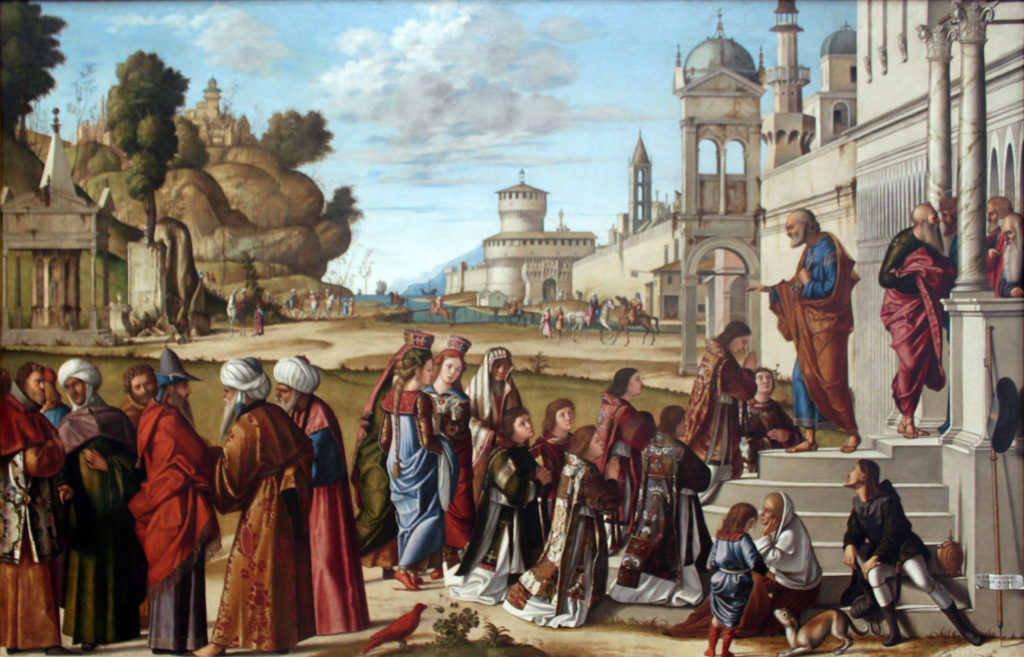[Greek] διακονία (diakonia),[Latin] diaconus]: service, ministry, relief, support, attendance (as a servant), aid; Acts 1:17,25 Acts 6:1,4, Acts 11:29, Acts 12:25, Acts 21:19, Rom.11:13, Rom.12:7, Rom.15:31, 1Cor.12:5, 1Cor.16:15, 2Cor.3:7-9, 2Cor.4:1, 2Cor.5:18, 2Cor.6:3, 2Cor.8:4, 2Cor.9:1,12-13, 2Cor.11:8, Eph.4:12. Col.4:17, 1Tim.1:12, 2Tim.4:5,11, Heb.1:14, Rev.2:19

The ordination of St. Stephen as deacon: painting by Vittore Carpaccio (1511)
Background information:
Greek Hellenism: This term, used in a secular sense, means service, rendering service, ministration, and public service. Plato’s Republic 371c states “If the farmer or any craftsman taking his products to the marketplace does not arrive at the same time with those who desire to exchange with him, is he to sit idle in the marketplace? There are men who see this need and appoint themselves to this service.” Aeschines’ Against Ctesiphon 3.13 states “That whatever a man is called on to under special enactment, this is not an office, but a sort of commission and public service.” Demosthenes’s On the Crown 18.206 states “If I had attempted to claim that you were first inspired [to serve] with the spirit of your forefathers by me, everyone would justly rebuke me. But I do not. I am asserting those are your principles.”
Old Testament: This term means servant, retainer, child, attendant, and rendering service. He also sent him gold dishes and a table service (1Macc.11:58). The king’s servants answered him, ‘Haman is waiting in the court’ (Est.6:5). The chief steward assigned Joseph to them, and he became their steward (Gen.40:4). Aaron shall wear it when ministering, that its sound may be heard as he enters and leaves the Lord’s presence (Exo.28:35). They shall assist their fellow Levites in the tent of meeting in performing their duties (Num.8:26). Moses would return to the camp, but his young assistant Joshua never left the tent (Exo.33:11). These attended the king, in addition to those whom the king has stationed in the fortified cities throughout Judah (2Chr.17:19).
New Testament: This term means ministry (position of authority) and service. Service can involve serving others, ministering, providing provisions (contributions), and waiting upon. Matthias succeeds Judas in a serving ministerial position, which provides the basis for the position of deacon. Martha is burdened with serving others. A new service ministry is created in order to serve the neglected widows. Financial support is also needed to support the holy ones in Jerusalem. Christian service, oriented to the Gospel, supersedes the limitations of the Law.
Scripture:
“He was numbered among us and was allotted a share in this ministry.” Acts 1:17
Judas was to originally partake in this ministry. Matthias was to replace Judas. This references the ministry of service.
“For the administration of this public service is not only supplying the needs of the holy ones but is also overflowing in many acts of thanksgiving to God.” 2Cor.9:12
This service is part to provide for the material needs to the poor in Jerusalem. This service also pertains to serving others.
“Now if the ministry of death, carved in letters on stone, was so glorious that the Israelites could not look intently at the face of Moses because of its glory that was going to fade, how much more will the ministry of the Spirit be glorious? For if the ministry of condemnation was glorious, the ministry of righteousness will abound much more in glory.” 2Cor.3:7-9
Paul refers to the Mosaic covenant as a ministry of death because of its limitations. The Mosaic covenant was once glorious. The Mosaic covenant, a ministry of condemnation, is inferior to the new covenant of righteous and reconciliation. This new covenant surpasses the Mosaic covenant.
Conclusion:
Deacon, deaconate
In the Greek Hellenistic era, it was interesting to discover a secular aspect of service. It was a great and prestigious honor to serve the state in some capacity (Even today, this value continues today in political circles.) Or this could simply be a farmer selling his wares at the marketplace.
In the Old Testament era, this term takes on a primarily religious sense. The religious sphere essentially takes on a public and national authority (like the state). Servants served or attended to priests and some kings.
In the New Testament era, this term refers to the ministerial office of deacon and service (in various ways). It is noteworthy that this notion of service is much larger than the position of deacon. It was interesting to discover that the Law was called the ministry of death and condemnation. The superior New Covenant is called the ministry of reconciliation. Service can take on various forms ranging from serving food, waiting on tables, being a minister, and financially supporting the poor.
That’s all for now. I hope that this post can be of some service to you.
